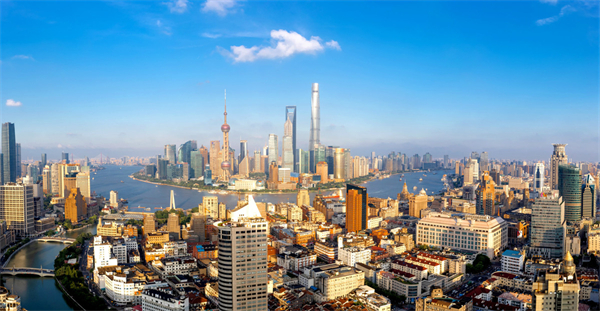Guideline to enhance biz climate

High-rises dominate the skyline on both sides of the Huangpu River in Shanghai. [Photo by Gao Erqiang/China Daily]
China's clear guideline to rein in excessive administrative inspections of enterprises is part of the country's efforts to foster a more enabling business climate and bolster the confidence of private firms, a backbone of economic growth, analysts said.
Arbitrary fines and forfeitures, out-of-jurisdiction enforcement, maximum penalties, and other issues, which have long been a source of frustration for businesses, should be addressed head-on to create a level playing field, the experts added.
Administrative inspections are crucial for government agencies to guide businesses toward lawful operations. However, some localities and departments have been engaging in arbitrary behaviors while conducting such inspections, causing disruptions to enterprises, said the State Council, the country's Cabinet, last month.
A natural gas transmission company in Shandong province, according to cases published by the Ministry of Justice in November, has endured over 100 inspections annually from 2021 to 2023, conducted by various government agencies including those responsible for safety, and energy, across provincial, municipal, county and township levels.
"The sheer volume of inspections faced by this natural gas company is truly staggering, and it speaks to a larger systemic issue where enterprises are being overburdened by arbitrary enforcement practices," said Zhao Peng, director of the School of Law-based Government, which is part of the China University of Political Science and Law.
The key is finding a sweet spot where the government provides necessary regulatory oversight, but also respects the autonomy and rights of enterprises. This is not an easy balance to strike, but is essential for unleashing the full potential of China's vibrant private sector, Zhao added.
To this end, the frequency and intensity of government inspections must be carefully calibrated, so as to eliminate excessive interference, while also ensuring that targeted regulatory functions are not neglected, according to the guideline.
The key requirements include clearly identifying the government agencies responsible for conducting these inspections and streamlining the list of inspection items. Meanwhile, government agencies should adhere to strict standards and procedures when carrying out inspections, and scale back the frequency of on-site visits to businesses, according to the guideline.
The goal here is to establish clear boundaries and procedures for administrative inspections, eliminating the potential for abuse and enhancing predictability in the regulatory environment, said Zhu Lijia, a professor at the National Academy of Governance.
The new guideline comes after the government's recent emphasis on nontax revenue growth — including fines and confiscations, as well as returns on State-owned assets and capital — caught the attention of the market due to its potential risks to the overall business environment and market sentiment.
In the first 11 months of last year, nontax revenue climbed 17 percent year-on-year to about 3.7 trillion yuan ($507 billion), while tax revenue declined 3.9 percent year-on-year to 16.19 trillion yuan, data from the Ministry of Finance showed.
"We cannot simply assume that the rapid growth in penalty and confiscation-related revenues is synonymous with profit-driven law enforcement," said Xu Hongcai, deputy head of the financial and economic affairs committee of the National People's Congress.
However, it is clear that in recent years, some local authorities have been aggressive in their approach, prioritizing revenue generation over fair and responsible enforcement practices, Xu said.

Ministry of Justice of the
People's Republic of China
All rights reserved. Presented by China Daily.
京ICP备13016994号-2


